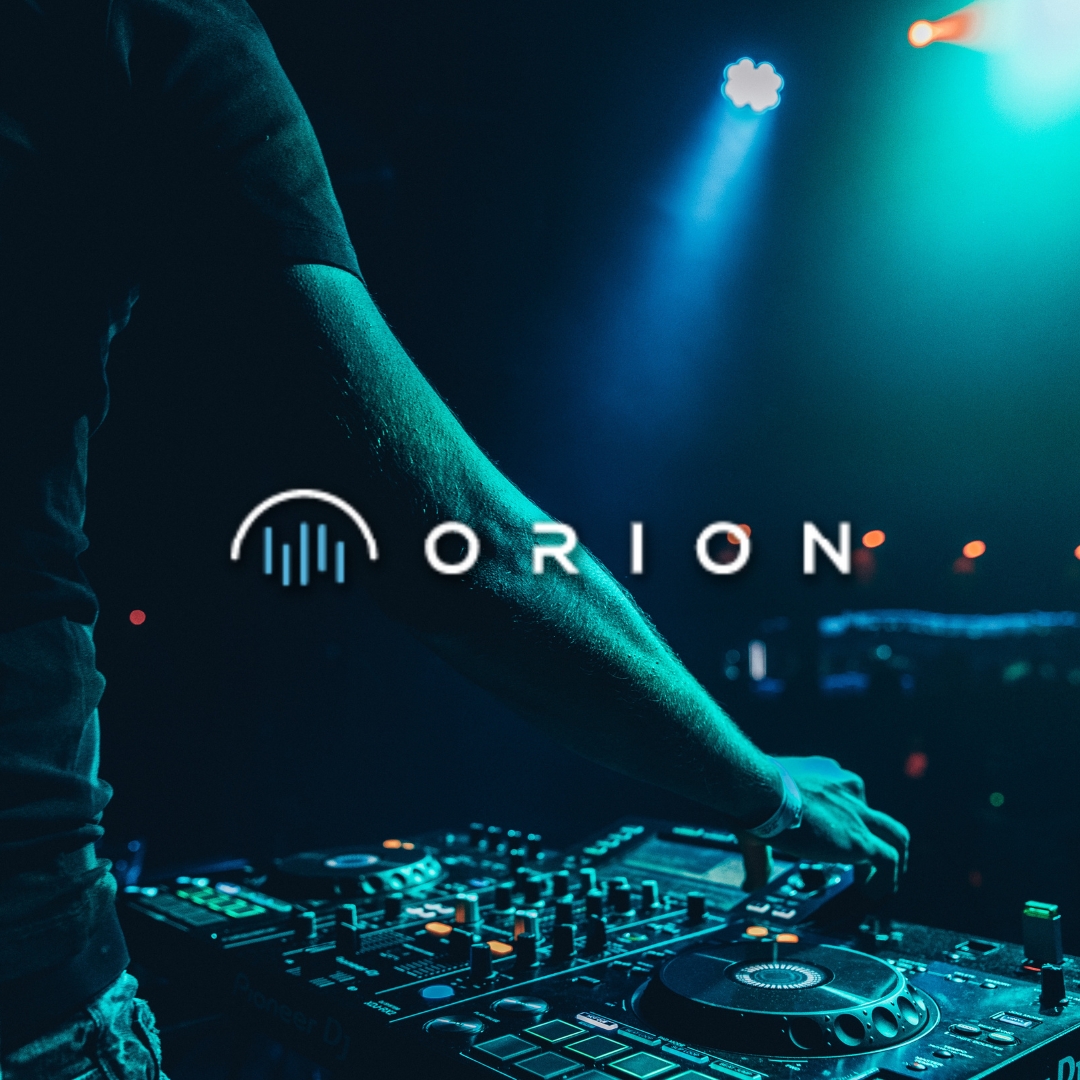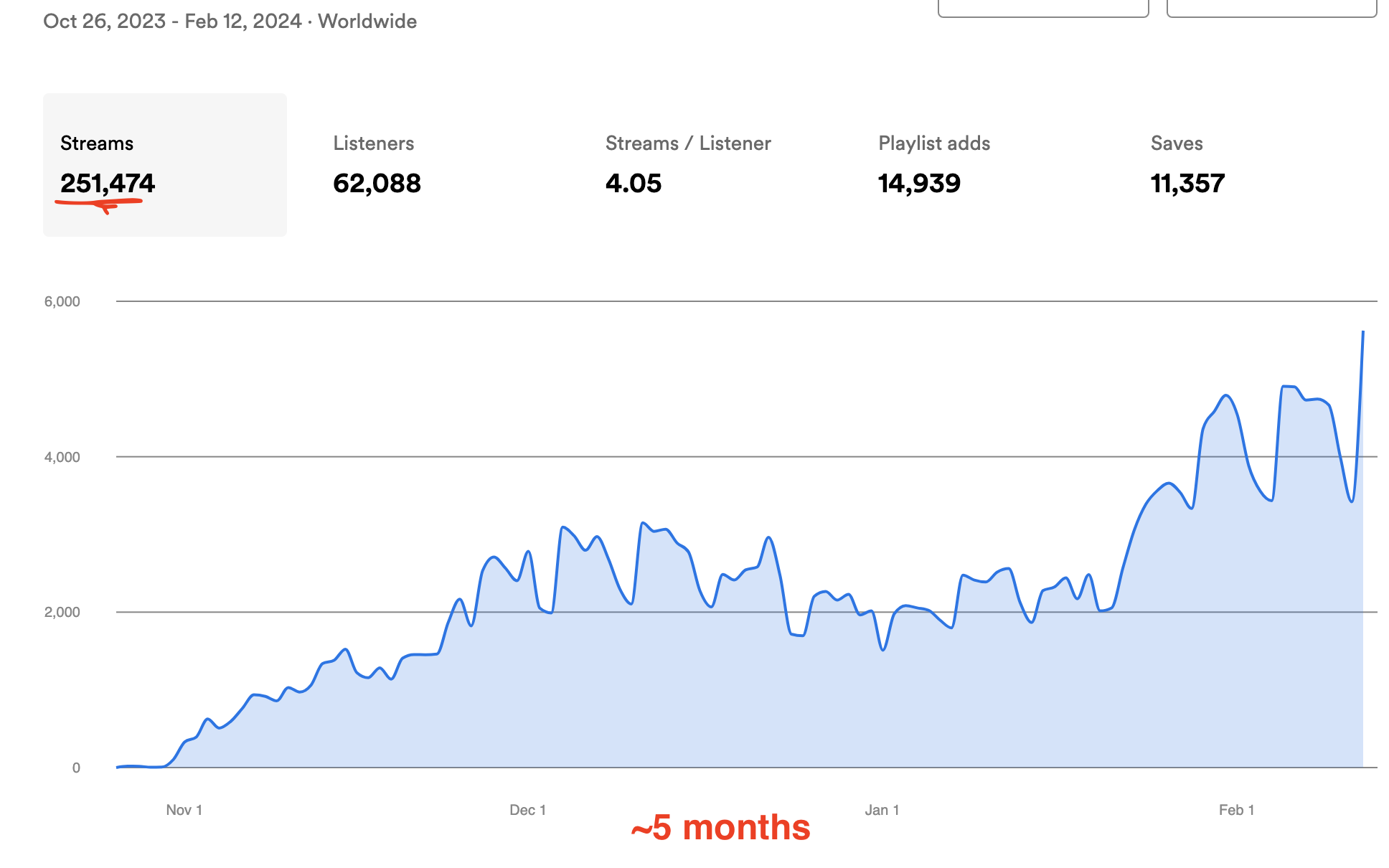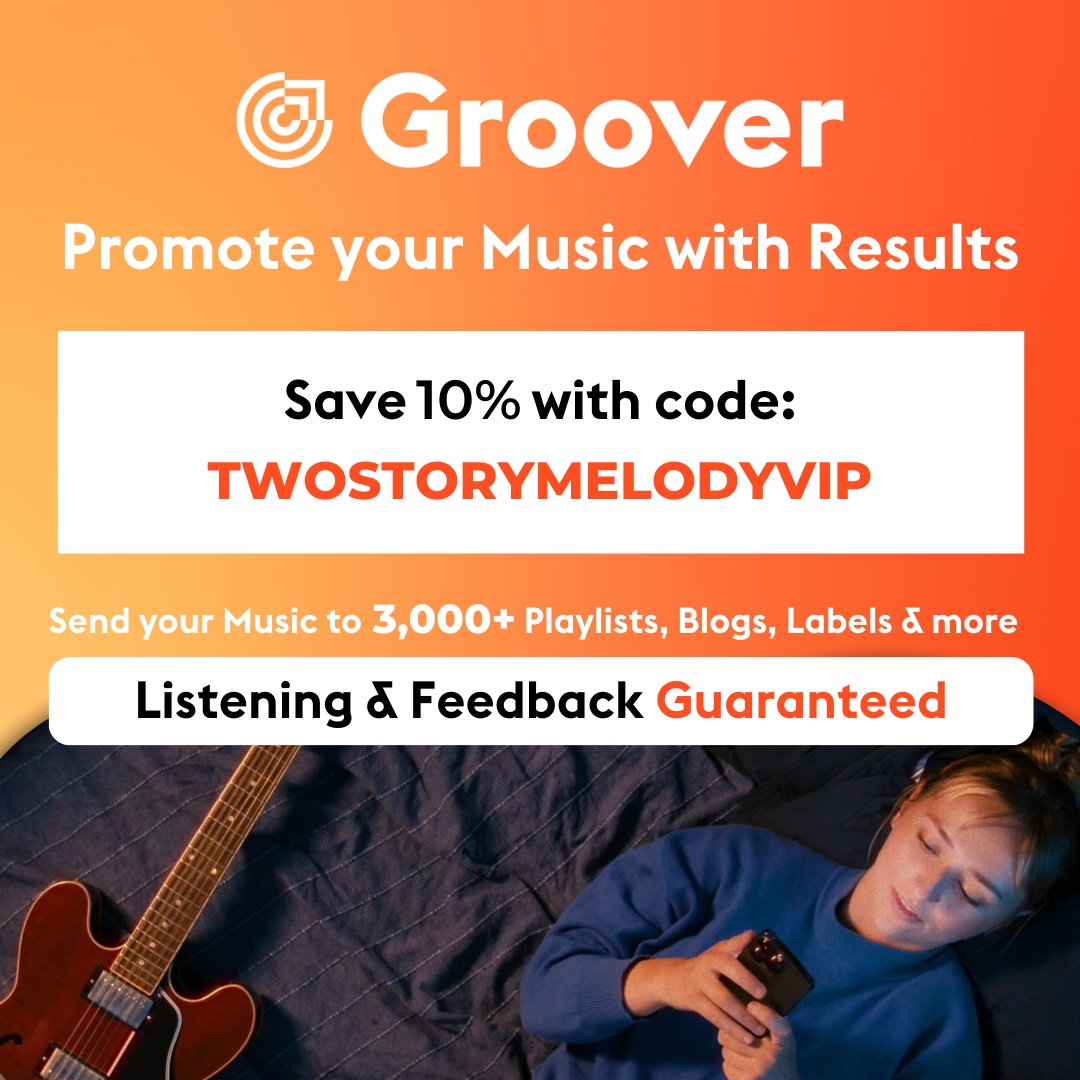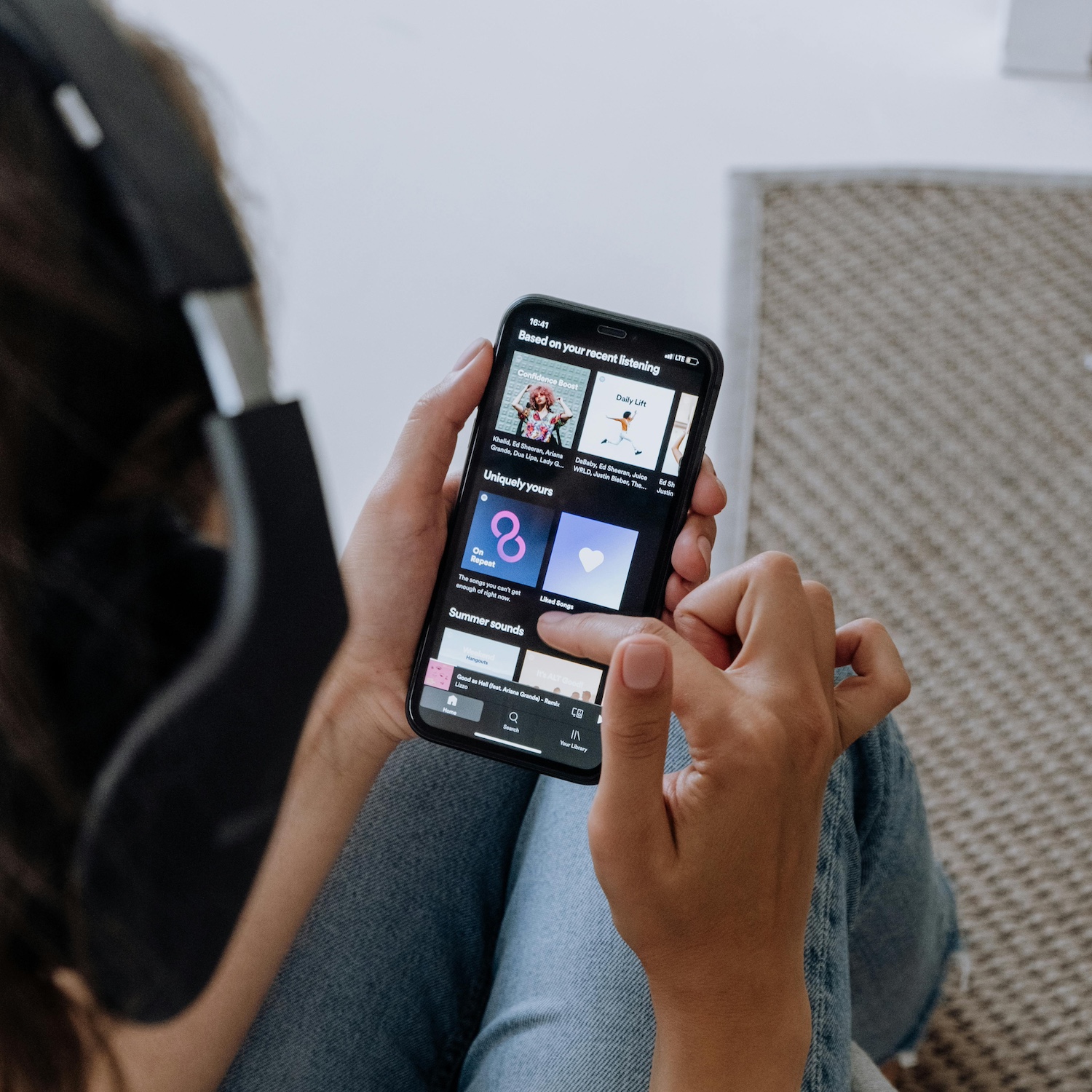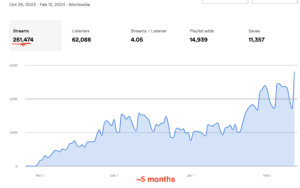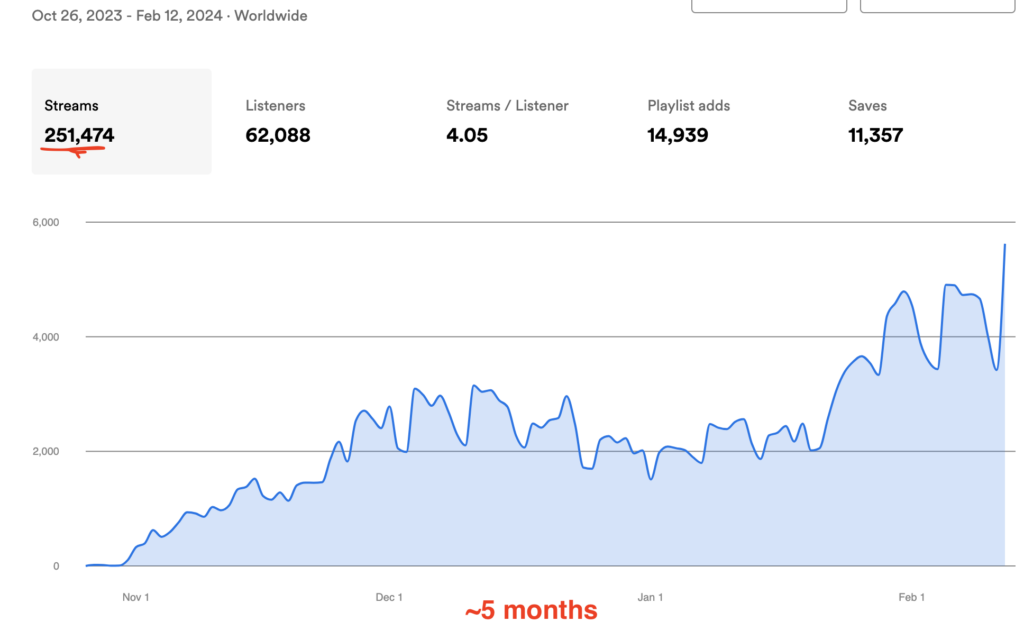Thinking about using Orion Promotion and wondering if they’re legit? I’ll give you the short answer first, and then we’ll get into the details.
Short answer: Yes, they’re legit. Based on a campaign I ran with these guys, they got real results.
I paid $209 to promote a song. Orion Promotion was able to place it on seven playlists that drove a total of about 3,000 streams. While I wouldn’t consider the playlists to be high-fit in terms of genre / niche for the song we promoted, I do think that they’re built with real people (i.e., not bots).
Basically, Orion Promotion did what they said they would do – and they actually surpassed my expectations in terms of cost per stream.
That said, everything’s not rainbows and sunshine. Playlisting, in general, doesn’t drive very engaged streams, because most people listen to playlists as sort of background music. And as I mentioned of Orion specifically, the lists we were placed on were at best broad fits for the song, so engagement numbers were lower than I would have liked to see. As I’ll unpack in more depth below, there are pros and cons.
But long-story-short, I’ve tried dozens of Spotify campaigns from dozens of different companies, and I’d consider Orion’s offering (or at least my experience of it) to be legitimate – not spectacular, but solid.
If you want to give these guys a shot, here’s the link to check them out.
(Heads-up, that’s an affiliate link, which means if you do run a campaign with Orion, I’ll get a commission.)
And if you want more details of my results with them, then good call, and keep reading.
The background on my campaign with Orion Promotion
I always like to provide context on my reviews, because I feel like a) transparency is nice and b) context helps you to sort things properly in your head. With that said, I know these articles get long, so if you just want to get my analysis of the results, feel free to skip this part.
But if you’re still here, here’s the backstory:
A few years ago after trying, among others, Omari MC and Playlist Push, our blog wrote a post on the top Spotify promotion services. Almost immediately, that post went nuts.
It started ranking on the first page of Google for searches like “Spotify promotion,” and as a result, I got a bunch of companies reaching out to me asking if I would add them to the list. It was… kind of weird. But I tried the ones I thought seemed decent (some turned out to be scams and some were legit) and over time, the list grew.
Then, in early 2023, I decided to do it all over again.
I wanted to make sure the post was up to date, so I solicited my email list for volunteers, then spent several thousand bucks to try 15 different Spotify promotion companies for 15 different songs. My goal was to validate my previous results and (potentially) unearth a few new companies that I’d heard of, but never tried.
Orion was one of those companies.
And that whole process is how I ended up promoting Andrew Gordon’s track, “She’s What He Needs”.
Andrew’s a classic, Americana-type of songwriter, with lyrics that paint pictures from personal experiences and soundscapes built on rambling piano lines and a touch of country-blues electric twang. My references are admittedly pretty limited, but his music reminds me of The Avett Brothers or maybe Josh Ritter.
It’s not quite mainstream stuff, but in my opinion, it’s the type of music that should be able to find a fit on certain playlists without too much trouble – so we gave it a shot.
The Orion Promotion process
I opted to try Orion’s highest pricing tier, which, at $209, is honestly still pretty cheap compared to a bunch of the other companies in this space. (For reference, that’s below the entry point for Playlist Push.)
Orion (like Playlist Push, SoundCampaign, and a bunch of others) requires you to set up an account with them before submitting an order for promotion. Once you’ve created an account, you’ll get access to a dashboard portal, where you can create campaigns. Here’s what that looks like:

You can see the “Create New Campaign” button in the above image – as you might have guessed, hitting that is the next step toward creating a campaign. Once you’ve done that, you’ll be taken through a smooth little setup wizard to clarify your campaign settings.

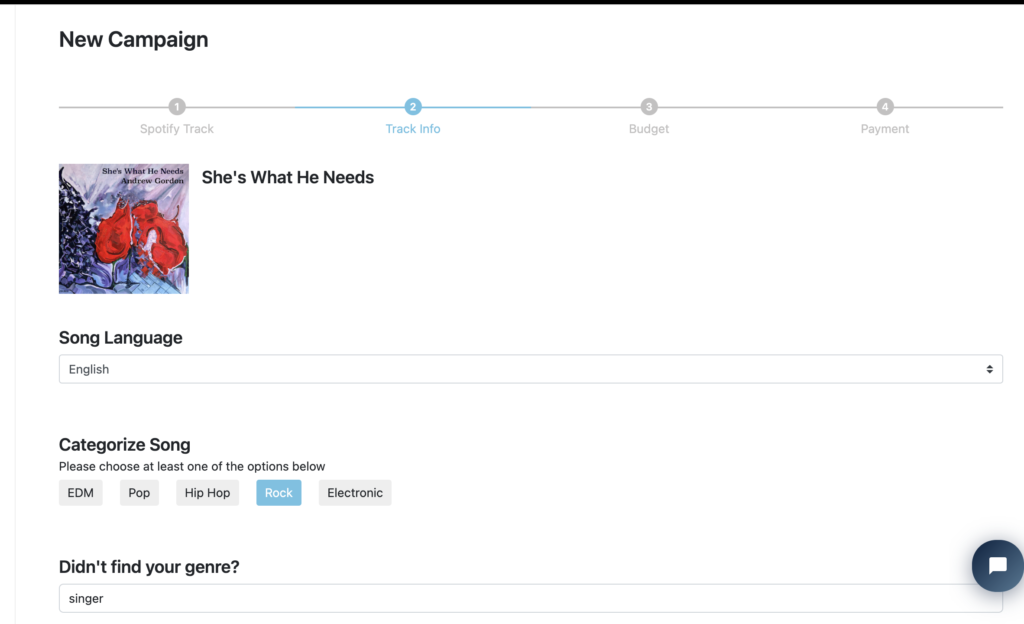
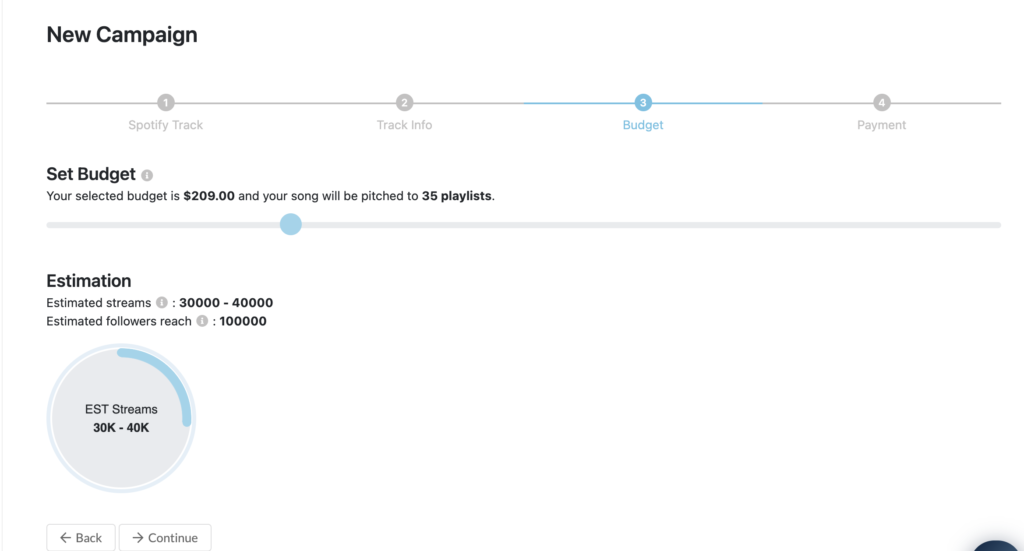
A couple of notes on this process:
1. You’ll notice that you’re required to select at least one of five main genres: EDM, Pop, Hip Hop, Rock, and Electronic.
You do have the option to add additional genres via a search box, but the fact that you’re required to pick something mainstream is a bit of a giveaway that Orion Promotion is looking for, well, mainstream music.
2. You can set your budget as low as $79 or as high as $1,500. The more you pay, the more playlists you’ll be pitched to; it’s a spectrum, and at the highest end of it you can be pitched to 65 playlists.
Relatedly, it seems like the pricing tiers that Orion shows on their front-side page are kind of made up, although they do show you the correct entry-level price.
Once you’ve submitted payment, things get under way. I got confirmation to my email:
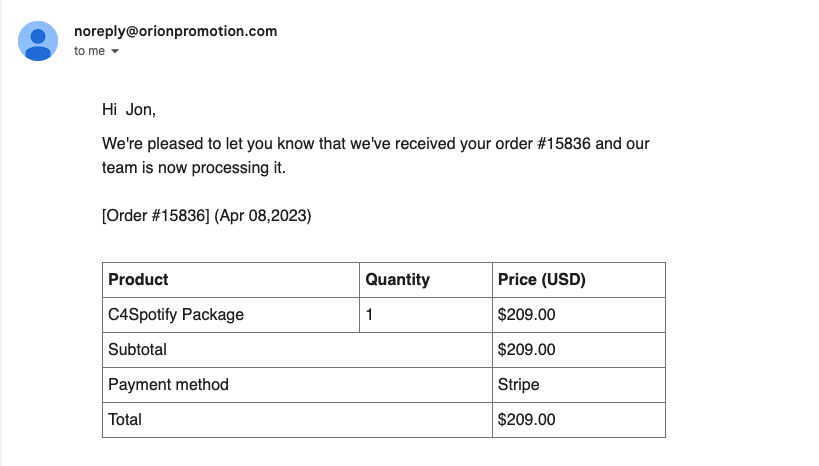
And almost immediately after that, the placements started coming in.
My results from Orion Promotion
In that one reddit thread on Orion Promotion, one of the common complaints people had was that Orion’s process was slow and that playlist placements took a long time to come in. (As someone who’s done PR as a service myself, I find this complaint kind of annoying, but also I tend to be grumpy.)
For our campaign, at least, the opposite was true: Placements came in very quickly. Literally on the same day I completed the order, I started getting a bunch of emails that looked like this:
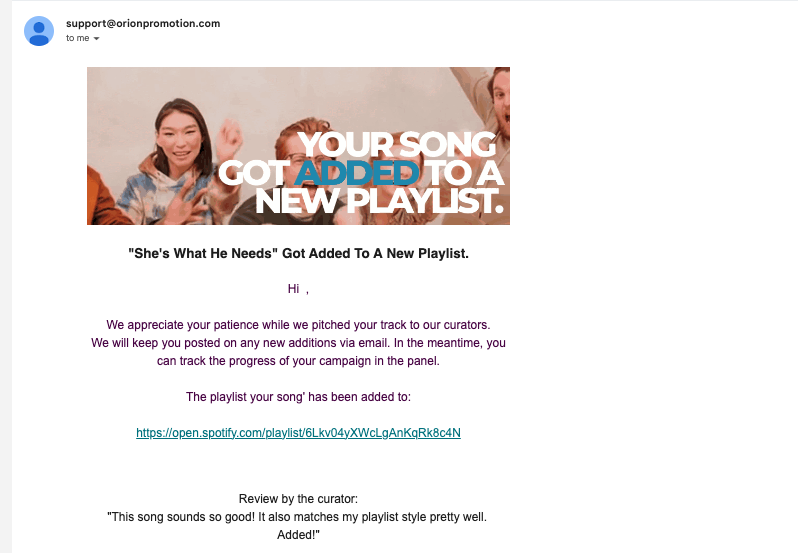
All told, I got seven of those, because we were added to seven playlists. Here’s the complete list:
- Retro Pop
- Pop Chronicle
- Piano Pop Songs to Chill and Relax
- Friss Pop
- Todo Indie
- Pop Party
- Pop Rising
Scan through the titles of those, and you can pretty clearly see the common theme: pop music. This is almost certainly because, yep, I selected “Pop” as the main genre in the little setup wizard – even though Andrew’s song is definitely not a mainstream pop song.
If I went back and did this campaign again, I’d probably try “Rock” as the main genre instead. Either way, though, I think it’s obvious that the best genre fit for the song would be something much more niche, like “folk songwriter” or “Americana”. I did select both of those genres using the little search box, by the way, but clearly they didn’t have much effect on Orion’s pitching process.
The takeaway, like I said at the top of this piece, is that the fit of these playlists left a bit to be desired. (For an explanation of why playlist fit is important, see Jason Grishkoff’s helpful post.) These lists weren’t totally off – speaking very, very broadly, “She’s What He Needs” is a pop song, and some of the lists, like “Piano Pop Songs,” drill down closer to the mark. But nothing here hits the nail on the head.
With that said, I do think that the playlists were built legitimately – that they had real followers and not bots. To illustrate, here are the follower growth charts for two of the campaign’s most-streamed playlists:
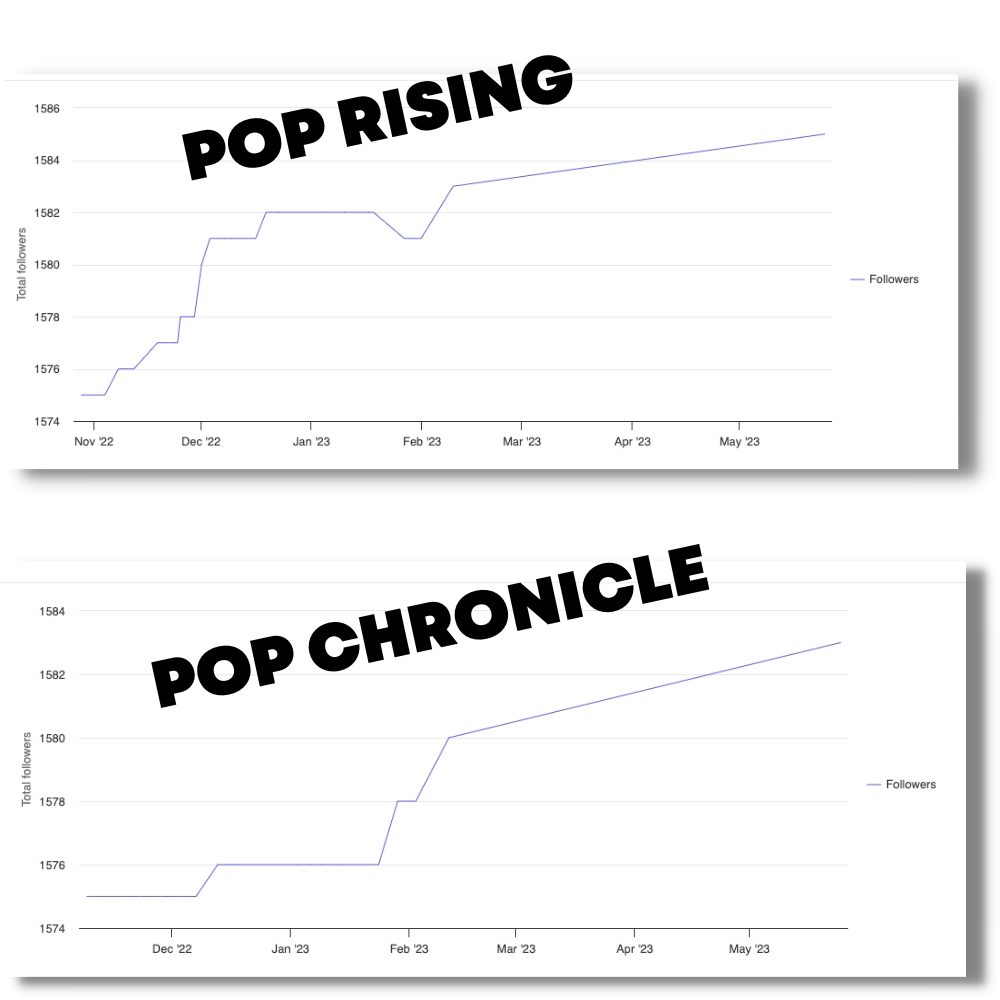
They’re not perfectly smooth, but they’re generally moving in the right direction, and there are no major dips or spikes that would signal bot activity. (The one dip, on Pop Rising, is only a drop of a couple of followers – when you use bots, you typically lose hundreds of followers at once because Spotify purges accounts in bulk.)
And then here’s what the streams looked like in the Spotify for Artists account:

You can see that, before the Spotify campaign, the track was getting very little traffic, and then the playlist spike is obvious. Interestingly, it still hasn’t tailed off; usually you’ll get removed from playlists after about a month, but we’re still getting streams from the Orion playlists seven weeks later.
You’ll also see that engagement rates for the song are pretty low, but are well within the range of normalcy. I’ve seen plenty of bot streams, and with those, you’ll usually see a streams-per-listener ratio that’s unnaturally high (like 8 or something) or ridiculously low (like right next to zero).
The takeaway is that, as far as I can tell, the playlists and the streams are legitimate.
Pros and Cons
So, that’s what happened. For the final part of this breakdown, I’ll summarize the results one more time, and then I’ll lay out what I see as the pros and cons.
A quick summary of results
I typed all of this out in the second paragraph, but here it is again in case you’re skimming:
I spent $209, which resulted in 7 playlist placements and just over 3,000 streams. As of this writing, my estimate is that the cost-per-stream for the campaign was $0.07, which is pretty good.
Most of the playlists were what I’d consider to be low-fit, however, and likely as a result, the song’s engagement numbers are low. Still, the song has ticked up in Radio streams over the past month (with 46 plays in the past month after getting roughly 100 in the previous 10 months). So despite the low engagement, there’s been a very slight boost in algorithmic traction.
The pros of Orion Promotion
1. These are pretty cost-efficient streams.
Orion Promotion falls into the upper-third of the 15 companies I tried in terms of cost-per-stream. Their campaigns are really affordable. This one, which they’d label a “premier” campaign, only cost $209, which wouldn’t even get you in the door at Playlist Push.
If you’re on a budget, that’s appealing.
2. The playlists and streams seem legitimate.
These aren’t the most engaged playlists I’ve seen, but they do seem to have real followers. The follower growth curves look decent, and the activity in Spotify for Artists doesn’t appear unnatural.
3. Most of the streams are from the United States.
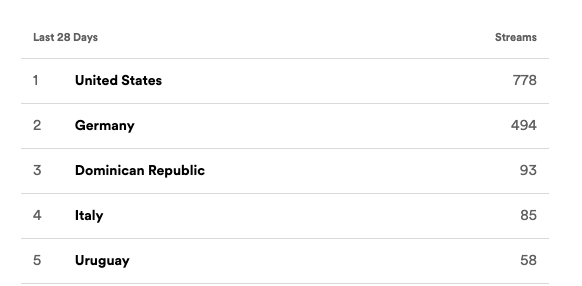
I want to clarify: Location is not necessarily an indicator that these are legitimate streams. In fact, the most recent bot streams I saw were also from the United States.
But, given that these streams do appear to be legitimate, I view the fact that they’re from the US as a bonus, for two reasons. First, Andrew is Canadian, and as he puts it, “cracking the US market is a big deal for Canadian artists,” so it’s nice for him to get in front of ears in the States. And second, US streaming royalties tend to be higher (although, to be honest, the total income from this campaign will be so low as to make that irrelevant).
Make of it what you will.
4. The system was pretty easy to use.
To be fair, most of the platforms I’ve reviewed are easy to use, so this isn’t hugely unique. But I can tell that the company has spent some time and care on the portal, so I wanted to note it.
The cons of Orion Promotion
1. Their playlists seem to be heavily focused on mainstream music.
This is by far my biggest complaint, and I’ve made it a few times now: These playlists are just really broad, and that almost certainly affects the level of engagement they generate.
From the outset, when Orion forces you to pick one from five mainstream genres, it’s clear that this is a platform that’s not great at subtlety.
My opinion is that, if you’re working in a sub-genre (and let’s be real, most artists are), you probably won’t find a high-fit playlist through Orion.
2. I noticed that their system has a few glitches.
Actually, I’m not sure “glitches” is the right word; it’s more like there are just a few things that don’t line up with what they communicate in other places.
For example, as I mentioned above, the front side of Orion’s website mentions that there are three pricing tiers – but in the setup wizard, you pick your budget from a range. That’s no big deal, but it is a little confusing.
Similarly, in the portal, I can see that eight curators reviewed our song, and that six of them apparently placed it in a playlist. But via email, I found that we’d been added to seven playlists, not six. My guess is that one curator added us to two lists, but that’s not visible anywhere in our dashboard. Again, no big deal, just a little confusing.
3. There’s no way to contact curators.
Orion’s dashboard functions similarly to the one from Playlist Push; you have the option to rate a curator’s response, but you can’t communicate directly with any of the curators you’re pitched to.
I can see some rationale for that, but personally, I prefer models like SubmitHub or SoundCampaign, where you have the option to chat back and forth with curators. That can form the basis of more meaningful relationship; this version feels more like a black box.
Final thoughts
All told, this was about what I expected. I was pleasantly surprised by the amount of streams we received at a low price point, and I was a little disappointed with the fit of the playlists and the resulting engagement metrics. I don’t think this will have a huge long-term impact, but considering the song was starting from near scratch, the small bump in Radio play is something.
I guess it’s a mixed bag, which is kind of par for the course with playlisting at the end of the day.
Two final thoughts here:
- If you have the budget, I always recommend balancing playlisting campaigns with Facebook ads. Ads tend to be much more expensive on a cost-per-stream basis, but they also have ridiculously high engagement rates – my opinion is that, together, these two tactics represent the best of both worlds.
- Numbers aren’t everything. Playlisting is a tempting tactic because it promises a lot of streams – but that’s never the end goal. Relationships are. Playlisting can be a means toward that, but don’t spend on promotion just because you want to see a bigger number next to your track. Your music matters more than that.
With all of that said, here’s the link one more time to try Orion’s Spotify promotion.
Hope this review was helpful as you sort through your options. Whether you go for it with Orion or not, here’s wishing you good luck.

